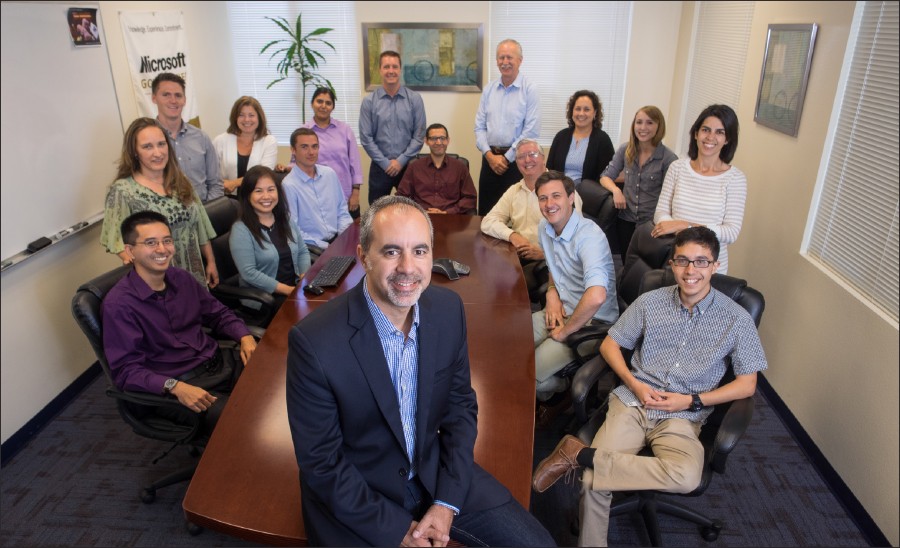
Michael Daoud, center, founded Visus 20 years ago, at the dawn of the Internet age. The Santa Barbara-based software firm has since grown to serve some of the largest companies on the South Coast.
SMALL BUSINESS | June 27 – July 3, 2014
By By Stephen Nellis
Staff Writer
When Michael Daoud founded Santa Barbara software firm Visus 20 years ago, America Online launched its first portal onto something called the World Wide Web, letting home users access it for the first time. About a quarter of American homes had computers, and in San Francisco, the first-ever conference on the commercial potential of the Web featured Marc Andreessen, founder of a fledgling startup called Netscape, as a key speaker.
But what really surprises Daoud as Visus prepares to celebrate two decades in business is how little has changed. When he started the firm in 1994, people came to him because they wanted their technology to solve business problems. And despite the rise of cloud-based Web apps, smart phones and tablets, that hasn’t changed.
“The reality of all this — of all the change — is that the fundamentals of building good software are still the same,” Daoud told the Business Times.
Daoud, an immigrant whose family was displaced by fighting in Lebanon, started the company after being laid off by Delco, the electronics division of General Motors. Visus has since grown to serve some of the biggest companies on the South Coast, writing code for Deckers Outdoor Corp. and Network Hardware Resale, among others. It has also helped the county of Santa Barbara with mapping applications and designed the Web-based ordering system for Rusty’s Pizza, the South Coast restaurant chain.
Daoud trained as an engineer, rather than a programmer, and brought with him part of what he calls the “secret sauce” for the company’s success over the years: The conversations that take place before code is ever written. Software needs to solve business problems, so it’s key to understand the business and what that problem is, which might be different from what the customer first asks for. Daoud said many clients come to him after trying another software shop first.
“We have all the key stakeholders come together over several meetings to discuss the problem. Let’s say somebody wants to build a house. If they go straight to a contractor, they’re probably going to get a four-bedroom house that’s not the one they pictured in their head. Unfortunately, there are software companies that go straight to the keyboard,” Daoud said. “There are clients who are all about code and cost, and those aren’t the right clients for us.”
But there’s quite a bit that has changed since 1994. In particular, the use of the Web and mobile technologies in distributing and deploying software has evolved. Users now expect anything with a screen to be able to access their data and run their apps. “It started with consumers, but now it’s moved to business: ‘I’m on my phone or iPad, and I need to see my financials.’ People want to work on any device,” Daoud said.
Users often assume that since Web and mobile apps run through browsers and phones, the software is fairly lightweight and most of the work is occurring on servers somewhere using straightforward code. But the apps can actually reach fairly deep into a computer’s hardware resources, even if it’s Web-based, and maintaining different code for desktop browsers, Android and iOS isn’t as simple as it sounds. In some ways, writing Windows-compatible code in the 1990s was simpler.
“It’s actually fairly complex because there are so many more technologies you have to integrate,” Daoud said. “There are all these layers you have to take care of, but it’s interesting because it’s what makes the Web so powerful.”
Another aspect that’s changed is the economy of the South Coast. Daoud recalls when Highway 101 had stoplights at State Street. Some of the firm’s small clients in the 1990s have become very large ones, he said. And the toughest point in the company’s life was 2001, when the bursting of the tech bubble and terrorism dealt a one-two blow.
“The scariest time was just after 9/11. Business just seemed to vanish. As an entrepreneur, those times test you. Percentages and ratios are much bigger when you’re smaller. I decided to stick it out, and here we are,” Daoud said.
These days, Visus is expanding into business intelligence — that is, making sense of the massive amounts of data that companies constantly accumulate to provide insights.
“Business intelligence was a natural progression for us doing a lot of reporting from our applications,” Daoud said. “When you have billions of bytes of data, you have to build cubes of data to get answers out of data in seconds rather than hours. Right now, business intelligence offers management insights into the health of a business. The next step is, how do you take that data and make predictions?”
For the next 20 years, Daoud wants to expand Visus, but not too much.
“My dream is to have a team of 100 to 150 — not bigger,” Daoud said. “I want it to be manageable and nimble. The old saying is ‘Nobody ever got fired for hiring IBM,’ because they were the gold standard. I want that to be the same for Visus.”


